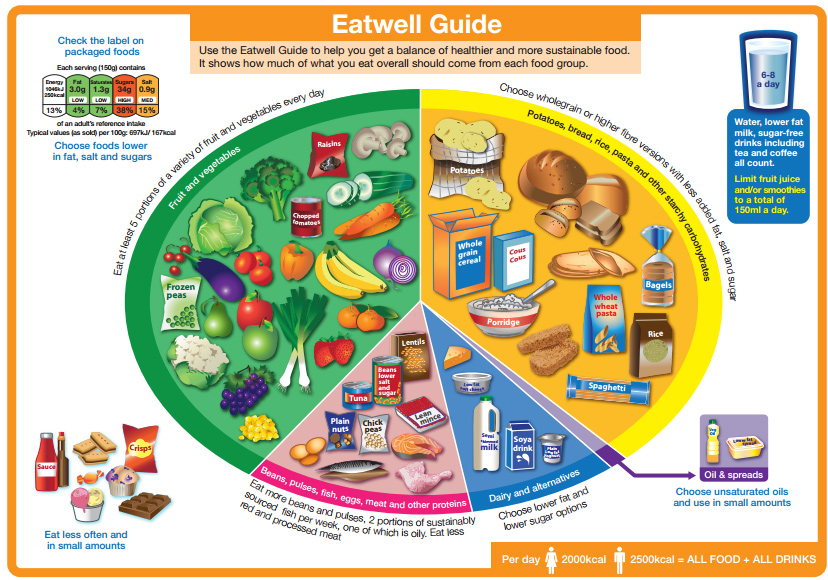A Balanced Diet is Key
Eating a healthy, balanced diet is an important part of maintaining good health, and can help you feel your best. This means eating a wide variety of foods in the right proportions, and consuming the right amount of food and drink to achieve and maintain a healthy body weight.
Aim to enjoy a variety of delicious foods, so you get all the key nutrients you require. The amount of food consumed needs to match how active we are each day to avoid unwanted weight gain. Healthy eating doesn’t mean avoiding your favourite foods; it’s about striking a healthy balance. If you choose treats at one meal or snack then look for healthier choices at the next. Remember that sweets are a treat and should be consumed in small quantities, 20 grams is a recommended portion size.
The government’s “Eatwell guide” shows what foods to eat and in what proportions to get the balance right

Keep Hydrated
We all need water for good health and for our bodies to function properly, in particular it helps our brain and to control our body temperature.
Aim to drink plenty throughout the day as levels of hydration can fluctuate constantly. Being properly hydrated will ensure that your energy levels are high. It is great for your muscles and joints and can even improve your mood!
Eat your 5 a day

Fruit and vegetables are a vital source of vitamins and minerals and should make up just over a third of the food we eat each day. It’s advised that we eat at least five portions of a variety of fruit and vegetables every day. There’s evidence that people who eat at least five portions a day have a lower risk of heart disease, stroke and some cancers.
For further reading, these links give some great information about diet:
http://www.nhs.uk/Livewell/Goodfood/
https://www.nutrition.org.uk/
Keeping your family fit and healthy

To live a healthy life we need to be sure that we take care of all aspects of our lives and those that we love.
Enjoy a balanced diet
A diet based around the right amounts of starchy foods like potatoes, bread, rice and pasta, eaten with plenty of fruit and vegetables, protein rich foods like meat, chicken, fish or lentils, milk or dairy in measured quantities and making good choices about salt, fat and sugar will provide all the nutrients that you need.
Dental care
Brush your teeth with fluoride toothpaste twice a day for about two minutes to help keep your teeth and mouth healthy. Children need to be helped or supervised brushing their teeth until they’re at least seven years old.
Keep Active
Try to keep active in your daily life. You could join the local gym, or other types of exercise can include dancing, gardening, golf, cycling, bowling, playing with the children and even housework! Finding an activity that you enjoy will make it seem much more of a pleasure. Walk whenever you have the chance as it’s free and if you can join a friend on the walk it gives you an ideal chance to catch up. Get off the bus a stop early or walk up the stairs. A pedometer can be a great way to track your steps and see if you are on target.
Ensure a work-life balance
Finding a work balance is often a challenge, especially these days where we are expected to answer emails, texts and calls on the move, wherever we are and whatever else we are doing it can be hard to find time to wind down.
Remember the importance of family time, exercise, leisure, hobbies and friendships – all of these have positive effects on the balance of our lives. Try to ensure that you protect the time that you spend on these areas of your life and when you feel the balance slipping try to take steps to readjust. When you plan your week, make it a point to schedule time with your family and friends, and activities that help you recharge.
Relaxation & sleep
Try and build in some relaxation time into each day to help you prepare for a sound night’s sleep. You may have a young family, a job that involves long or unsociable hours or just find it hard to fit in any downtime on a regular basis.
Whether it’s a soak in the bath, reading a book, catching up on your favourite box set or doing something that helps you destress, try and devote a little time to yourself, however brief.
A good night’s sleep is also essential for good health.Try to avoid taking mobile phones to bed and turn off the TV in good time. Wind down by reading or doing gentle stretches.
Try to make your bedroom the perfect place to relax. Your bedroom should be cool – between 60 and 67 degrees. Your bedroom should also be free from any noise that can disturb your sleep. Finally, your bedroom should be free from any light, use black out curtains or blind to help. Check your room for noises or other distractions. If you partner snores- invest in ear plugs!

